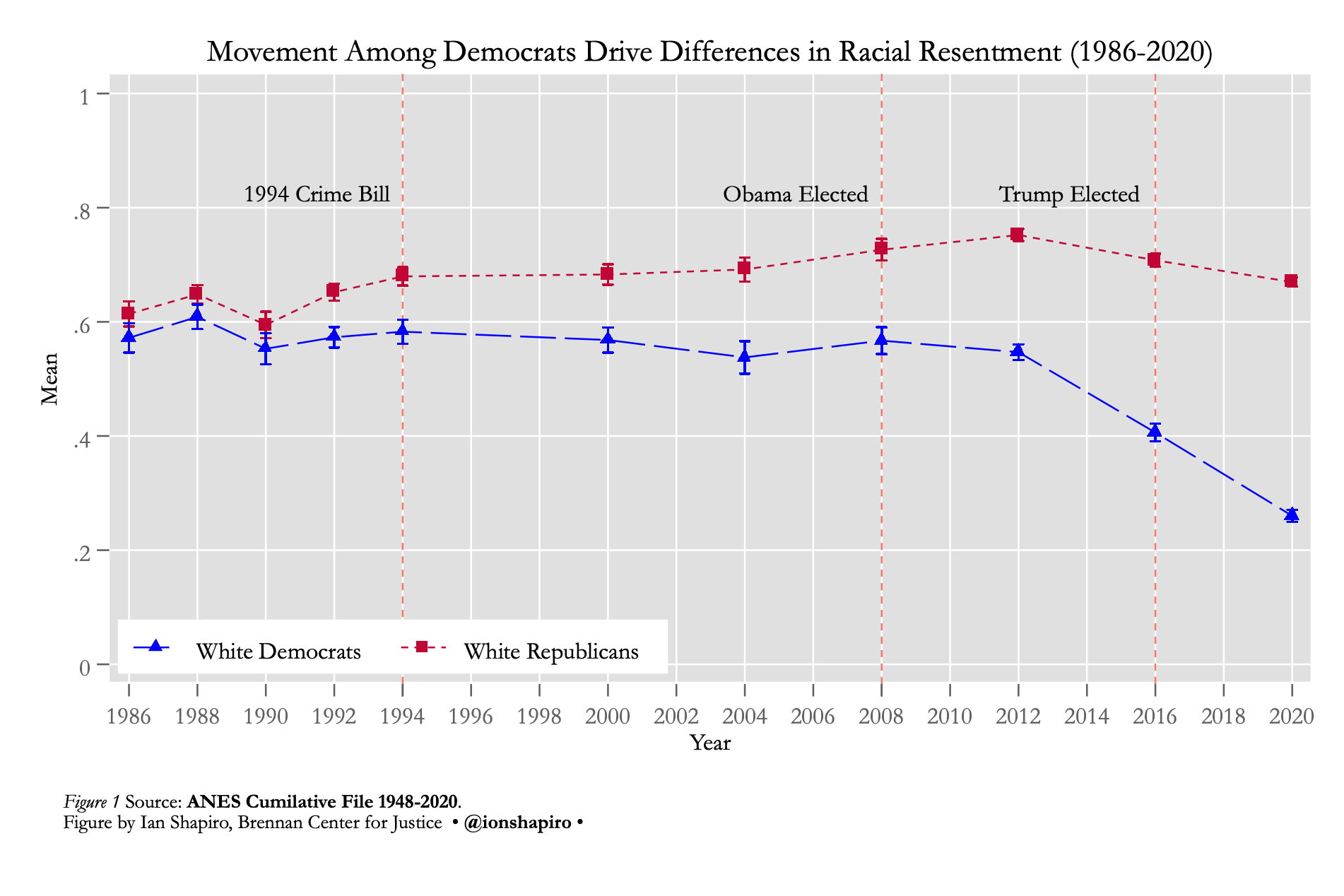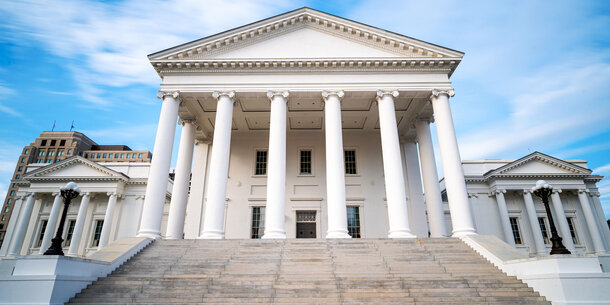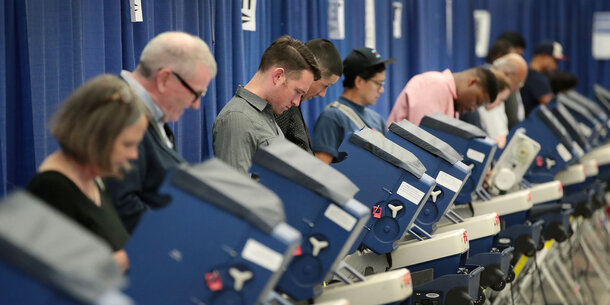This article first appeared in The Bulwark.
If you think race is a minor part of, or even a distraction from, the broader debate about the future of our democracy, let me introduce you to the last couple of weeks in American politics.
When President Joe Biden announced his intention to follow through on a campaign pledge to nominate a black woman to fill the seat of retiring Supreme Court Justice Stephen Breyer, a chorus of voices on the right grabbed every mic in sight to decry the president for eschewing meritocracy in favor of identity politics. And a few days later, when Donald Trump suggested during a campaign rally that he would pardon the convicted Jan. 6th insurrectionists (many of whom openly displayed their racism), folks on the left we-told-you-so’d over how in-step the former president’s move was with the right-wing politics of white grievance.
There is a real sense that the parties are further apart on questions of race today than they have been for some time—each side being pulled to the poles. But the truth is more complicated. The yawning gap between the parties is not, as is often suggested, because Republicans have become more racist and Democrats have become more woke; it is because the left has become more progressive on racial inequality while the right has fortified its pre-existing position.
Ian Shapiro, a colleague of mine at the Brennan Center for Justice, examined the levels of racial resentment among white Republicans and white Democrats going back to 1986, drawing on time-series data from the American National Election Studies. The data show that the two groups were close together and moving in tandem in the late 1980s and early ’90s, white Democrats harboring slightly less resentment than their Republican counterparts. The distance between the two, however, gradually increased between the mid-’90s and the early 2010s. And then, from 2012 forward, the gap exploded—the bottom dropping out of racial resentment levels among white Democrats.

First, a word about racial resentment. The metric was developed by political scientists Donald Kinder and Lynn Sanders in the 1980s as a way to measure white Americans’ attitudes toward black Americans. It is based on respondents’ answers to questions about how much they attribute socioeconomic disparities between black and white Americans to slavery and racial discrimination or to a lack of hard work and perseverance by black Americans. The more an individual agrees with the general sentiment that black people’s lack of effort is the primary reason for racial disparities, the higher that individual’s racial resentment score. And study after study has shown that people who voted for Donald Trump had higher levels of racial resentment than those who did not.
Here is what the measure is not: an x-ray; it is incapable of determining if there is, in fact, a racist bone in your body. Despite what some convenient misinterpretations might suggest, the racial resentment scale is not the equivalent of measuring personal bigotries or one’s racial hatred of a group. Moreover, some scholars have pointed out that it may be better understood as a measure of one’s worldview. People who prize individualism and a Puritan work ethic may register as having high levels of racial resentment even though their responses could more aptly be attributed to a conservative ideology than to overt prejudices toward black people. Through this lens, little wonder, then, that white Republicans as a group consistently show higher levels of resentment.
• • •
Yet, even with its imperfections in explaining race and voter attitudes, the racial resentment scale can serve as a useful tool in understanding the growing differences between white partisans and how views on racial groups intersect with electoral politics. Whereas white Republicans and Democrats used to hold similar views on black Americans’ status, they now hold deeply divergent positions on whether that status is owed to structural causes or personal behavior. The very public racialization of this change by the folks with loudest megaphones—and the lack of penalty for explicit racial intolerance—is causing real harm to our democracy.
As such, it feels somewhat intuitive that 2016 would lead to a dramatic shift. The Republican presidential primaries showcased the appeal of Trump’s populist mantle constructed from the prejudices toward people of different races, ethnicities, religions, and particular nations of origin. Meanwhile, the rise of a more progressive wing of the Democratic party contested establishment candidates in presidential and congressional primaries, unseating senior Democrats and pushing the party to spotlight systemic racism in its platform.
The gap between white Democrats and white Republicans had been slowly widening since the 1990s, but starting around 2012 it grew much more rapidly. One possible explanation for this timing: The killing of Trayvon Martin that year and the arrival the next year of the Black Lives Matter movement. The series of events that followed—a drumbeat of videos of black people being shot or strangled by police, militarized law enforcement clashing with protesters plastered nonstop on cable news, the demonization of kneeling athletes, and so on—showcased for white Democrats the structural nature of the challenges their black fellow partisans had long described.
It became clearer to them that a Puritan work ethic cannot escape a chokehold . . . that there’s no amount of trying harder that would have saved the nine black parishioners killed at Wednesday night Bible study by a self-avowed white supremacist. The small conversions on the right we saw following George Floyd’s murder—think Mitt Romney marching with Christian evangelicals while selfie-tweeting “Black Lives Matter”—had occurred nearly a decade earlier among white Americans on the left and with much larger effect.
Given all this, the present moment becomes a bit clearer. The manufactured political outrage over critical race theory, the 1619 Project, Biden’s Supreme Court pick, and trumped-up tales of voter fraud occurring in communities of color intentionally exacerbates a sense of racial division in the public in the name of political expedience. It feeds media narratives and electoral strategies that capitalize on the white grievance on the right and the demands for inclusion on the left. On the left, the partisan racial resentment disparity signals how race-centric appeals can mobilize a multiracial electorate; it’s not an accident that “Jim Crow 2.0” was used by some to characterize the need for voting rights legislation. And on the right, the racial resentment divide shows how white ethnonationalist appeals can be veiled by a colorblind conservatism—an evolution of the dog-whistling rhetoric that accompanied the Southern Strategy.
The effect is that Americans sense racial tensions are running exceedingly high and that half the country lives on a different planet. It bogs down long overdue and critically important political debates—debates that must contend with the continued presence of racism and its deleterious effects—with disingenuous and superficial takes on race relations that distract from the systemic reforms that two-thirds of Americans desire.
In this light, a longstanding truth resurfaces: Race relations is the means by which the weaknesses and vulnerabilities of our democratic society become most apparent. It is the dominant factor influencing who benefits, who is harmed, and which inequalities result from government action—or inaction. We cannot have real conversations about the future of our country—the size of government, the rights of individuals, the roles of institutions, the fairness of processes, the equality of opportunity—if we do not wrestle with how much our positions on these things are shaped by our views on race.



